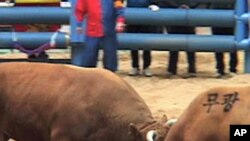There is not much that can stop an 800-kilogram bull in a bad mood … except, perhaps, another bull with a similar disposition. In South Korea, an annual Spring ritual has lots of people cheering for a battle of the bovines.
In the small South Korean town of Cheongdo, this large stadium almost seems out place. But every year, it comes alive for just one purpose.
The Cheongdo bullfighting festival attracts country and city dwellers alike - not by pitting bull against man, but by squaring off bull against bull.
In match after match, bulls bump heads and lock horns, with the loser being the first to turn away.
Bull-on-bull combat is not unique to Korea. It also exists in Southeast Asian nations and on the Japanese island of Okinawa.
Still, many Koreans have a special place for it in their hearts.
"I really miss these fights when they aren't going on," said a female spectator. "It's so much fun to watch, to see which ones win and lose."
"When my bull wins, it is as if our Korean team has just won a medal in a world competition," said a bull owner. "That feeling is what attracts owners like me into bull fighting. Bulls, unlike other animals, don't bite. They fight with raw muscular strength. [In human terms, it's like wrestling.]"
Sometimes the fight is over before it begins - like when a bull runs away from his opponent, dragging his owner behind him. Other times, the bulls face off for 20 minutes or more. The referee declares a victory when he feels certain that one bull has been scared off by another.
The fighting causes plenty of cuts and bruises that the owners have to treat. That has drawn criticism from some animal rights groups.
But owners say the bulls are pampered with special foods and grooming, and that the training increases their overall well-being.
Nam Ho-kyung, president of the country's biggest domestic cattle association, says the event rallies pride in his industry.
"Korean cows, or hanwoo, are a unique species in the world that lives only in Korea," said Nam Ho-kyung. "Raising them and holding fights between them are both part of our history. The Hanwoo species is recognized as having great physical power and stamina."
In high-tech modern South Korea, the fights remind many of that history of a simpler farming past.
Bulls Butt Heads in Annual Korean Spring Ritual
- By Kurt Achin




